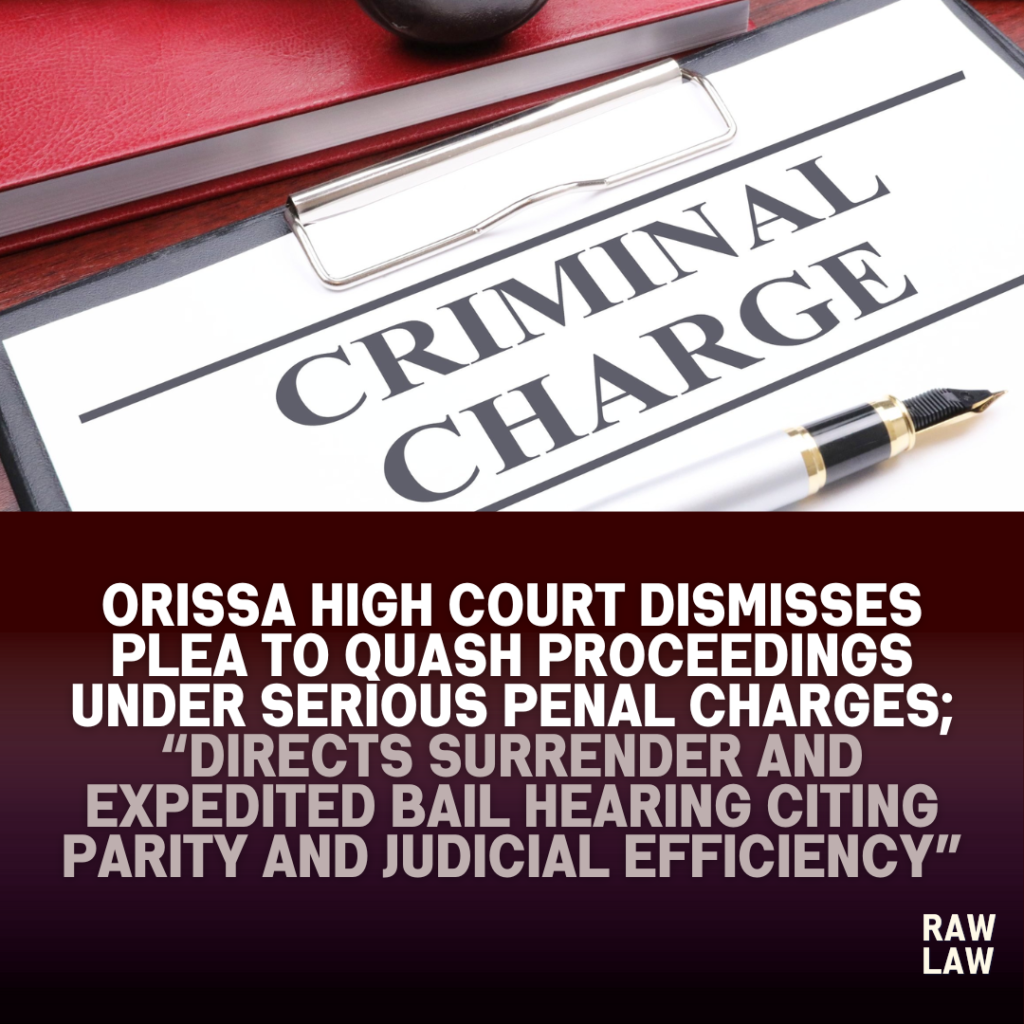“If co-accused have been granted bail, parity must be considered while deciding the bail plea of the petitioner” — Orissa High Court disposes of CRLMC petition as not pressed and grants liberty for bail plea on merits
Court’s Decision
The Orissa High Court dismissed a petition filed under Section 528 of the Bharatiya Nagarik Suraksha Sanhita, 2023 seeking quashing of criminal proceedings under several serious penal provisions including murder. While the petition was disposed of as “not pressed,” the Court granted liberty to the petitioner to move a discharge petition at the stage of framing of charge. The Court also directed the petitioner to surrender within 21 working days and permitted him to move for bail before the Magistrate in the first hour, with the direction that the Magistrate shall decide the bail plea strictly on the basis of materials on record. If bail is denied, the petitioner may move the higher forum in the second hour, and that forum must decide the bail on the same day, keeping in view principles of parity.
Facts
The petitioner had filed an application under Section 528 of the BNSS, 2023 seeking to quash the criminal proceedings arising out of Bhandaripokhari P.S. Case No.07 of 2023, registered for offences under Sections 147, 148, 323, 325, 307, 302, 452, 294, 354, 506 read with Section 149 of the Indian Penal Code. The matter pertained to allegations of unlawful assembly, rioting, grievous hurt, attempted murder, murder, house trespass, assault on women, and criminal intimidation. During the hearing, the petitioner opted not to press the quashing petition and instead sought liberty to raise objections at the charge-framing stage.
Issues
Whether the criminal proceedings in Bhandaripokhari P.S. Case No.07 of 2023 should be quashed under Section 528 of BNSS, 2023.
Petitioner’s Arguments
The petitioner, through counsel, submitted that he did not wish to press the application for quashing of proceedings. Instead, he sought liberty to file a discharge petition at the stage of charge framing and requested an opportunity to surrender before the concerned Magistrate to seek bail. No specific merits or grounds for quashing were urged during the hearing.
Respondent’s Arguments
No detailed arguments from the State were recorded in the order, as the petition was not pressed. However, the court noted that some co-accused persons had already been released on bail, a fact relevant to the parity-based bail direction.
Analysis of the Law
Section 528 of BNSS, 2023 empowers the High Court to quash proceedings, but the Court refrained from delving into the merits as the petition was not pressed. The legal principle of parity in bail matters was considered, especially since similarly situated co-accused were already granted bail. The Court’s approach reflects judicial discipline in disposing of procedural applications efficiently while preserving the petitioner’s rights to legal remedies like discharge and bail.
Precedent Analysis
While the judgment does not cite any prior judgments, the direction to decide the bail plea on principles of parity is grounded in settled legal jurisprudence which holds that similarly situated accused are entitled to similar reliefs, unless distinguishable on facts or involvement.
Court’s Reasoning
The Court reasoned that since the petitioner no longer pressed for quashing, the proper course was to allow liberty to seek discharge at the framing of charge stage. It also acknowledged the existence of bail orders in favour of co-accused and emphasized that bail should be considered promptly and fairly. By directing a time-bound surrender and expedited bail hearing, the Court balanced the seriousness of the charges with procedural fairness and parity.
Conclusion
The petition was disposed of as not pressed. The petitioner was granted liberty to raise all contentions at the stage of framing of charge by filing a discharge petition. He was directed to surrender before the Magistrate within 21 working days. The Magistrate was instructed to hear the bail plea in the first hour, and if denied, the higher forum was to hear the matter the same day, applying parity if relevant.
Implications
This order reiterates the importance of parity in bail jurisprudence and reflects the Court’s emphasis on procedural fairness in serious criminal matters. It also affirms that even when petitions under Section 528 of BNSS are not pressed, the accused is entitled to procedural safeguards such as liberty to seek discharge and time-bound consideration of bail applications. The case highlights how High Courts maintain equilibrium between prosecutorial interest and the rights of the accused in complex criminal cases.
Referred Cases and Their Relevance
No judgments were expressly cited in the order. However, the order relies implicitly on established precedents regarding parity in bail matters and the discretion of courts in allowing discharge petitions at the appropriate stage. The concept aligns with precedents like State of Rajasthan v. Balchand and Kalyan Chandra Sarkar v. Rajesh Ranjan, though not cited here.
FAQs
1. Can a criminal proceeding be quashed under Section 528 of BNSS if not pressed during hearing?
No, if the petition is not pressed, the court may dispose of it without examining the merits. However, the petitioner retains the right to seek discharge at the charge framing stage.
2. What happens if a bail application is rejected by the Magistrate after surrender?
The petitioner can immediately move the higher forum on the same day, and the higher court is expected to decide the bail plea expeditiously, particularly considering principles of parity.
3. What is the significance of parity in bail matters?
If co-accused in the same case are granted bail and the roles are similar, the principle of parity mandates that similarly situated accused should be treated equally unless exceptional circumstances exist.



